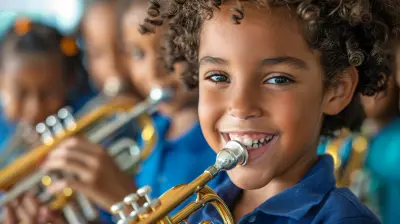The Role of Extracurriculars in Building Self-Esteem and Confidence
19 March 2025
Growing up is tough, right? As young people, we’re constantly bombarded with expectations—to excel academically, to form social connections, to figure out who we are, and what we want to do with our lives. And let's be honest, that’s a lot to handle! But here's something that often goes overlooked in this hectic journey: extracurricular activities.
Whether it's playing a sport, joining the debate team, learning an instrument, or volunteering at a local shelter, extracurriculars can be the unsung heroes in building self-esteem and confidence. And trust me, the benefits are far-reaching, often spilling over into other areas of life like school, career, and personal relationships. But why exactly are extracurriculars so powerful? Let’s dive in and find out!

What Are Extracurriculars?
Before we get into the nitty-gritty, let’s clear up what we mean by extracurricular activities. In simple terms, these are activities that fall outside the standard curriculum of academic study. So, while math, science, and literature are part of your school day, extracurriculars are the fun, engaging, and sometimes challenging activities that you voluntarily participate in during your free time.Think of it like this: If school is your main course, extracurriculars are the dessert—sweet, rewarding, and something you actually look forward to!
Common examples include:
- Sports (soccer, basketball, swimming, etc.)
- Arts (music, painting, drama)
- Clubs (chess club, science club)
- Volunteering and community service
- Hobbies (coding, photography, cooking)
But here’s the kicker: these activities do more than just fill your time. They play a key role in shaping who you are, especially when it comes to your self-esteem and confidence.

Why Self-Esteem and Confidence Matter
Before we dive into how extracurriculars help, let’s talk about self-esteem and confidence. These aren't just buzzwords; they're essential ingredients for a happy and successful life.1. Self-Esteem: This is how you see yourself—your inner sense of worth. Do you think you're capable? Do you believe you deserve respect and love? If the answer is yes, you have high self-esteem. If you're constantly doubting your worth, then it might be on the lower side.
2. Confidence: Confidence is a little different. It's more about how you feel in your ability to do something. Do you think you can ace that test? Can you give a speech in front of a crowd without turning into a puddle of nerves? That’s confidence!
Both self-esteem and confidence are crucial because they affect not only how you feel about yourself but also how others perceive you. People with high self-esteem and confidence tend to take more risks, try new things, and bounce back from setbacks. And guess what? Extracurriculars can be a game-changer in developing these traits.

How Extracurriculars Build Self-Esteem
1. They Offer a Sense of Accomplishment
One of the most satisfying feelings in the world is the sense of accomplishment that comes with achieving something. Whether it's scoring a goal in soccer, completing a painting, or finally nailing that tricky piano piece, extracurriculars give you tangible goals to work toward.When you reach those goals, the sense of pride and achievement skyrockets your self-esteem. You can look at what you've done and say, "I did that. I’m capable." And over time, these little wins accumulate, leading to a stronger belief in your abilities.
2. They Provide Opportunities to Learn New Skills
Let’s face it: mastering something new is a huge confidence booster. Whether it's learning to code, picking up a new language, or improving your public speaking, extracurriculars teach you skills that make you feel competent and capable.Plus, these aren't just skills you’ll use in your extracurricular activity—they often transfer into other areas of life. For example, learning leadership in a club can make you more confident when working on group projects in school. It’s like a ripple effect!
3. They Encourage Positive Feedback
In extracurricular activities, you often get feedback—not only from coaches and mentors but from your peers as well. When someone compliments your performance or tells you that you did a great job, it reinforces your sense of self-worth. You start to believe, "Hey, maybe I am good at this!" Who doesn’t love a little pat on the back?Positive feedback helps to combat that inner critic we all have, the one that says, "You’re not good enough." When you hear others recognize your talents, it becomes easier to silence that negative voice.
4. They Foster Personal Growth
Extracurriculars aren't always easy. Sometimes, they push you outside of your comfort zone, which is exactly where growth happens. Whether it’s trying out for a role in the school play or presenting a project in a science fair, stepping into unfamiliar territory can be nerve-wracking. But here’s the silver lining—every time you face a challenge and overcome it, your self-esteem grows.Think of it like going to the gym for your mind. The more you work those "I can do this" muscles, the stronger they become.

How Extracurriculars Build Confidence
1. They Encourage Socialization and Teamwork
Many extracurricular activities require teamwork and social interaction. Whether you’re collaborating on a group project, playing on a sports team, or jamming with a band, you have to communicate and work together with others.This is huge for confidence! Working with others shows you that your ideas matter, that you have something to contribute. It also helps you build friendships and connections, which can make you feel more secure in social settings.
2. They Teach You How to Handle Failure
Here’s a secret: Confidence doesn’t come from always winning. In fact, some of the most confident people have faced failure time and time again. When you participate in extracurriculars, you’re bound to experience a few losses or setbacks. Maybe you didn’t win the debate competition, or perhaps your art project didn’t turn out the way you envisioned.But here’s the thing: Extracurriculars teach you how to handle these failures in a constructive way. Instead of giving up, you learn to reflect, improve, and try again. This resilience builds a deep sense of confidence because you know that even if things don’t go your way, you have the ability to bounce back stronger.
3. They Provide Leadership Opportunities
Leadership roles—like being the captain of a team, the president of a club, or the lead in a play—are fantastic for building confidence. When you’re in charge, you learn to make decisions, guide others, and take responsibility for outcomes.Being in a leadership position forces you to step up, and that experience can be incredibly empowering. You begin to realize, “I can handle this,” and that belief carries into other parts of your life.
4. They Allow You to Step Into Different Identities
Extracurriculars provide a unique opportunity to experiment with different aspects of your personality. For instance, you might be quiet and reserved in the classroom but transform into a confident, outspoken leader on the debate team.Trying out these different roles helps you figure out who you are and what you’re good at. As you discover new strengths, your confidence naturally grows. It’s like trying on different hats until you find the one that fits just right.
The Long-Term Benefits of Extracurriculars
You might be thinking, "Okay, extracurriculars sound great for building self-esteem and confidence, but do these benefits last?" Absolutely! The skills and traits you develop through these activities don’t just evaporate once you graduate. They stick with you, influencing your future endeavors, relationships, and career.1. Career Readiness
Employers love candidates who have participated in extracurricular activities. Why? Because these experiences show that you’re well-rounded, capable of handling multiple responsibilities, and have developed soft skills like communication, leadership, and teamwork.2. Improved Academic Performance
Studies have shown that students who engage in extracurricular activities often perform better academically. The discipline, time management, and focus you develop spill over into your schoolwork, making it easier to manage your studies.3. Lifelong Friendships
Many people form lifelong friendships through extracurriculars. Bonding over shared interests creates strong connections that often last well beyond the school years.4. A Stronger Sense of Identity
Extracurricular activities help you discover your passions, strengths, and even weaknesses. This self-awareness is invaluable as you navigate life’s challenges, helping you make decisions that align with who you truly are.
Conclusion
Extracurricular activities are more than just a way to kill time after school. They are essential tools for building self-esteem and confidence, both of which are critical for personal growth and success. Whether you’re scoring goals on the soccer field, performing on stage, or volunteering in your community, you’re not just having fun—you’re building a stronger, more confident version of yourself.So, if you’ve been thinking about joining a club or picking up a new hobby, now’s the time. Trust me, your future self will thank you!
all images in this post were generated using AI tools
Category:
Extracurricular ActivitiesAuthor:

Eva Barker
Discussion
rate this article
11 comments
Peyton Peterson
This article effectively highlights the positive impact of extracurricular activities on self-esteem and confidence. While it recognizes the benefits, it would be valuable to also address potential challenges, ensuring a well-rounded discussion on the topic for readers.
April 8, 2025 at 3:30 AM

Eva Barker
Thank you for your insightful feedback! I appreciate your suggestion and will consider addressing potential challenges in future discussions to provide a more balanced perspective.
Riff McHugh
This article effectively highlights the significant impact of extracurricular activities on self-esteem and confidence. Engaging in such pursuits not only fosters personal growth but also enhances social skills, preparing individuals for future challenges. Well-articulated and insightful!
April 2, 2025 at 10:25 AM

Eva Barker
Thank you for your thoughtful feedback! I'm glad you found the article insightful and that it resonated with the importance of extracurricular activities in personal development.
Valen McAnally
Great insights! Extracurriculars truly shape confidence and self-esteem beautifully!
March 31, 2025 at 10:45 AM

Eva Barker
Thank you! I’m glad you found the insights valuable. Extracurriculars really do play a vital role in personal development!
Rook Sullivan
This article highlights the vital connection between extracurricular activities and personal development. Engaging in diverse activities not only enhances skills but also fosters social connections, which are crucial for building self-esteem. Encouraging students to participate can lead to lasting confidence and a strong sense of identity. Great insights!
March 31, 2025 at 4:26 AM

Eva Barker
Thank you for your thoughtful comment! I'm glad you found the connections between extracurricular activities and personal development resonant. Your insights on confidence and identity are spot on!
Paul Morris
Extracurricular activities provide essential opportunities for personal growth, enhancing self-esteem and confidence in students.
March 30, 2025 at 6:51 PM

Eva Barker
Thank you for your insightful comment! I completely agree—extracurricular activities are vital for fostering personal growth and boosting self-esteem in students.
Deborah Romero
Extracurriculars: Where confidence blooms and friendships flourish—let the fun begin!
March 30, 2025 at 3:26 AM

Eva Barker
Thank you! Absolutely, extracurriculars are a vital space for personal growth and connection!
Ardent Hughes
What a fantastic read! This article beautifully highlights how extracurricular activities can profoundly shape self-esteem and confidence in students. It's inspiring to see the positive impact these experiences can have on personal growth. Thank you for shedding light on such an important topic!
March 25, 2025 at 11:28 AM

Eva Barker
Thank you for your thoughtful comment! I'm glad you found the article inspiring and that it highlights the positive impact of extracurricular activities on self-esteem and confidence.
Cynthia Gomez
Extracurricular activities are vital for personal growth, fostering self-esteem and confidence that empower students for future success!
March 23, 2025 at 1:33 PM

Eva Barker
Thank you for your insightful comment! I completely agree—extracurricular activities play a crucial role in developing self-esteem and confidence, setting students up for future success.
Zethryn Mathews
Great article! Extracurriculars truly make a huge difference in boosting confidence and self-esteem. They can be such a game-changer!
March 23, 2025 at 5:53 AM

Eva Barker
Thank you! I’m glad you found the article insightful. Extracurriculars really do play a crucial role in personal development!
Dominique McNeal
Embrace those extracurriculars! They’re your secret weapon for boosting confidence and self-esteem!
March 20, 2025 at 10:00 PM

Eva Barker
Absolutely! Extracurriculars are powerful tools for personal growth and can significantly enhance confidence and self-esteem. Embrace every opportunity!
Sonya Potter
Extracurricular activities are more than just hobbies; they are vital tools for personal growth. By engaging in diverse experiences, students can discover their strengths, face challenges, and build resilience. Ultimately, these pursuits foster self-esteem and confidence, empowering individuals to thrive both academically and socially.
March 19, 2025 at 5:18 AM

Eva Barker
Thank you for highlighting the critical role of extracurricular activities in personal development. I completely agree that they are essential for fostering resilience, self-esteem, and confidence in students. Your insights reinforce the importance of diverse experiences in shaping well-rounded individuals.
MORE POSTS

The Psychology of Test Anxiety: Causes and Solutions

Building Critical Thinking Skills in a Homeschool Environment

The Influence of Stereotype Threat on Student Performance

How the Flipped Classroom Paves the Way for Deeper Learning

Extracurricular Activities: A Pathway to Lifelong Friendships

How to Use Formative Feedback to Drive Student Success

The Role of Ear Training in Effective Music Learning

Best Practices for Building a Strong School Music Program